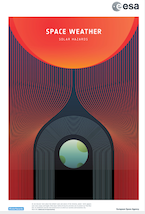Speaker
Description
PAN is an innovative energetic particle detection technology to precisely measure and monitor the flux and composition of highly penetrating particles (> ~100 MeV/nucleon) in deep space, which will have broad applications. PAN will fill an observation gap of galactic cosmic rays (GCRs) in the 100 MeV/n - GeV/n region, which will help to improve our understanding of the origin of GCRs and their propagation through the Galaxy and the Solar system. It will provide precise information of the spectrum, composition and timing of energetic particle originated from the Sun, which is essential for studying the physical process of solar activities, in particular those that produce intensive flux of energetic particles. The precise measurement of penetrating particles is also a unique contribution to space weather studies, in particular to the development of predictive space weather models in a multi-wavelength and multi-messenger approach, using observations both space and ground based. As indicated by the terminology, penetrating particles cannot be shielded effectively. PAN can monitor the flux and composition of these particles precisely and continuously, thus providing real-time radiation hazard warning and long-term radiation health risk for human space travelers. Once developed, PAN can become a standard device for deep space human bases and for deep space exploration and commercial spacecrafts, or as part of a space weather advance warning system permanently deployed in space. It can also be implemented on science missions to perform ground-breaking measurements for cosmic-ray physics, solar physics, planetary science and space radiation dosimetry.
PAN has been approved by the EU H2020 FETOPEN program to develop a demonstrator in 3 years (2020-2023).

